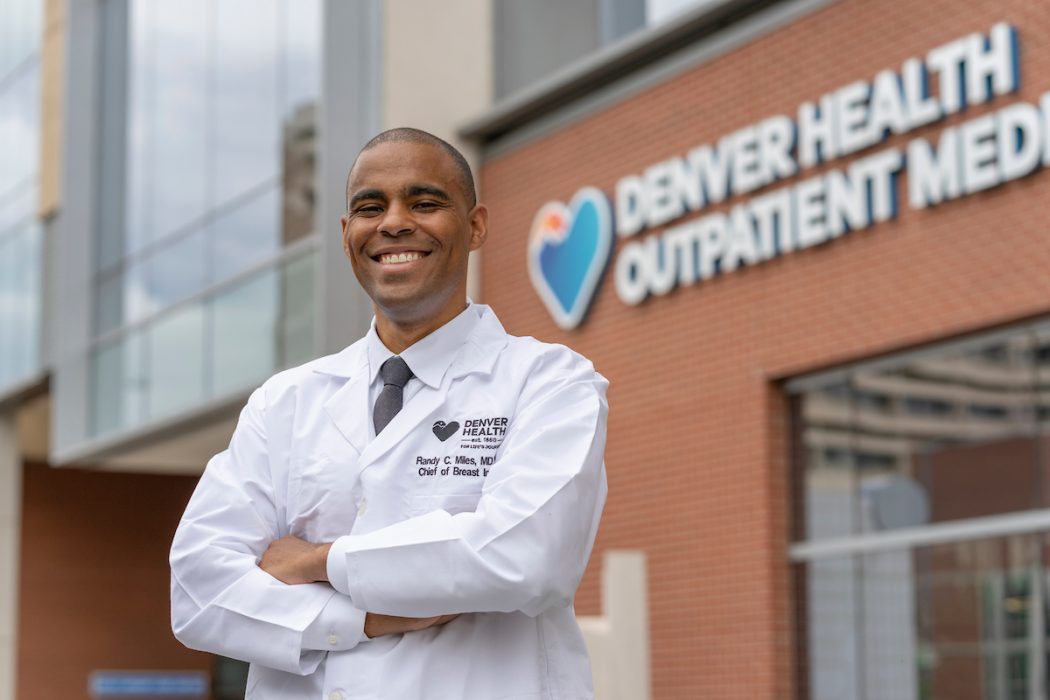Dr. Randy Miles Leads Breast Imaging Division
October 30, 2023
Denver Health makes notable improvements in patient care delivery
Denver Health Radiology operates out of 18 sites throughout Denver and Colorado including the Federico F. Peña Southwest Family Health Center and Downtown Urgent Care (DUC) Center, as well as the Denver Health Winter Park Medical Center, a unique medical facility located at the base of Winter Park Resort. Most of the radiology services offered are concentrated on Denver Health’s downtown campus in the main hospital building and the Outpatient Medical Center (OMC), which opened in 2021.
One of the primary divisions of Denver Health’s Radiology department is Breast Imaging. Denver Health Breast Imaging offers a full spectrum of imaging techniques for detecting and diagnosing breast cancer, using the latest equipment. Patients have access to the most up-to-date technology, including “3D” mammography with tomosynthesis and the latest ultrasound units.
Dr. Randy Miles is Chief of Breast Imaging and Associate Director of Service in the Radiology department at Denver Health. Miles earned his medical degree from Mayo Clinic College of Medicine, where he was awarded the Miller Award for Humanitarianism related to his work leading medical mission trips to Haiti and the Dominican Republic.
He completed his master’s in public health degree from Harvard School of Public Health during medical school, where he was selected as a Zuckerman Fellow. He completed his diagnostic radiology residency training at the University of Illinois-Chicago, where he served as chief resident, and completed his breast imaging fellowship training at the University of Washington Medical Center/Seattle Cancer Care Alliance.
Miles was recruited to Massachusetts General Hospital and Harvard Medical School following his fellowship training. He joined Denver Health in February 2022.
“One of the primary things that attracted me to Denver Health was the great team already in place in Breast Imaging including our Women’s Health and Mobile Unit,” said Miles of his colleagues. “Women coming to Denver Health are receiving some of the best care in the country.”
Upon arrival, Miles focused first on quality of care and access to that care, standardizing protocols and streamlining many of the division’s operating processes.
“Everyone that comes in for a diagnostic examination now starts off with the same imaging protocols,” he explained. “If there are additional views that are needed, those can be obtained at the radiologist’s discretion. But that gives us a baseline, so everyone is getting the same quality of care.”
Under Miles’ leadership, imaging wait times have decreased dramatically. He wanted to work with the outstanding Denver Health team to eliminate as many barriers as possible for people who are seeking breast exams.
“When I arrived, we had a wait time of two months for mammography exams. We looked at how we could streamline appointments to optimize scheduling,” he said.
To achieve this, Breast Imaging essentially changed their Fridays to all-day screening appointments.
“That helped us bring our appointment wait time down to less than two days. Most women can now get a screening appointment as soon as the next day,” said Miles. Test result times for imaging have also been reduced—if a patient has MyChart, they often see their results within two hours of their exam.
Breast Imaging has also decreased turnaround time for biopsies. Biopsies are typically scheduled between 8:00 a.m. and 10:00 a.m. but Miles and his team have made time in the schedule to include add-on biopsies under their same day biopsy program.
“We know that having a biopsy can make a patient very anxious, so we’ve tried to reduce the time between a biopsy recommendation and the actual biopsy,” explained Miles. “We don’t pressure patients—some want to go home and talk to their families or process the information—but we absolutely try to offer them this option.”
Adding 3D mammography to Denver Health’s state-of-the-art examination services was also essential. Breast Imaging started to offer 3D mammography in April 2022. 3D mammography aids radiologists in better identifying breast cancer and reducing call-backs that can cause unnecessary anxiety and can sometimes initiate unnecessary biopsies.
“3D mammography is particularly helpful in women with dense breast tissue where small cancers can be obscured,” said Miles.
Breast Imaging provides educational material to patients to help them make an informed choice, outlining the differences between 2D and 3D mammography. Miles emphasizes that 2D mammography remains an important exam for detecting breast cancer.
“3D mammography just gives us a little more information by being able to look at ‘slices of the breast’ to differentiate suspicious findings from overlapping normal breast tissue,” he explained. “Now every woman has the option to choose whether or not they want the 3D exam.” Miles says that close to 90% of patients choose 3D mammography.
Philanthropy has played a crucial role in Denver Health Breast Imaging advancements. A grant from a partnership between the American Cancer Society and National Football League has supported mobile mammography, and Richmond American Foundation provided funding for 3D mammography implementation and a dedicated patient navigator for the division, among other developments.
“Now that we have a patient navigator named Alma, I don’t know how we would operate without her,” said Miles. She is bilingual, and Miles credits her with helping to retain many Spanish-speaking patients, not only breaking down language barriers, but cultural barriers as well by easing patient concerns and educating Breast Imaging team members.
Miles hopes that among other advancements, philanthropy will allow Denver Health to place mammogram and ultrasound machines in every Family Health Center across the city, fund additional patient navigators, and support important genetic counseling and mental health services. This would free up the Mobile Mammography Unit to visit other sites in the community.
“The impact will be immense if we are able to bring screening mammography to patients in their communities at all of our family health centers, significantly reducing barriers for our patients,” said Miles.
